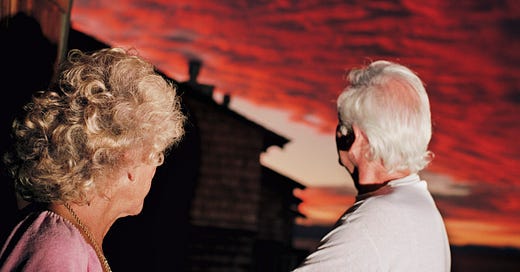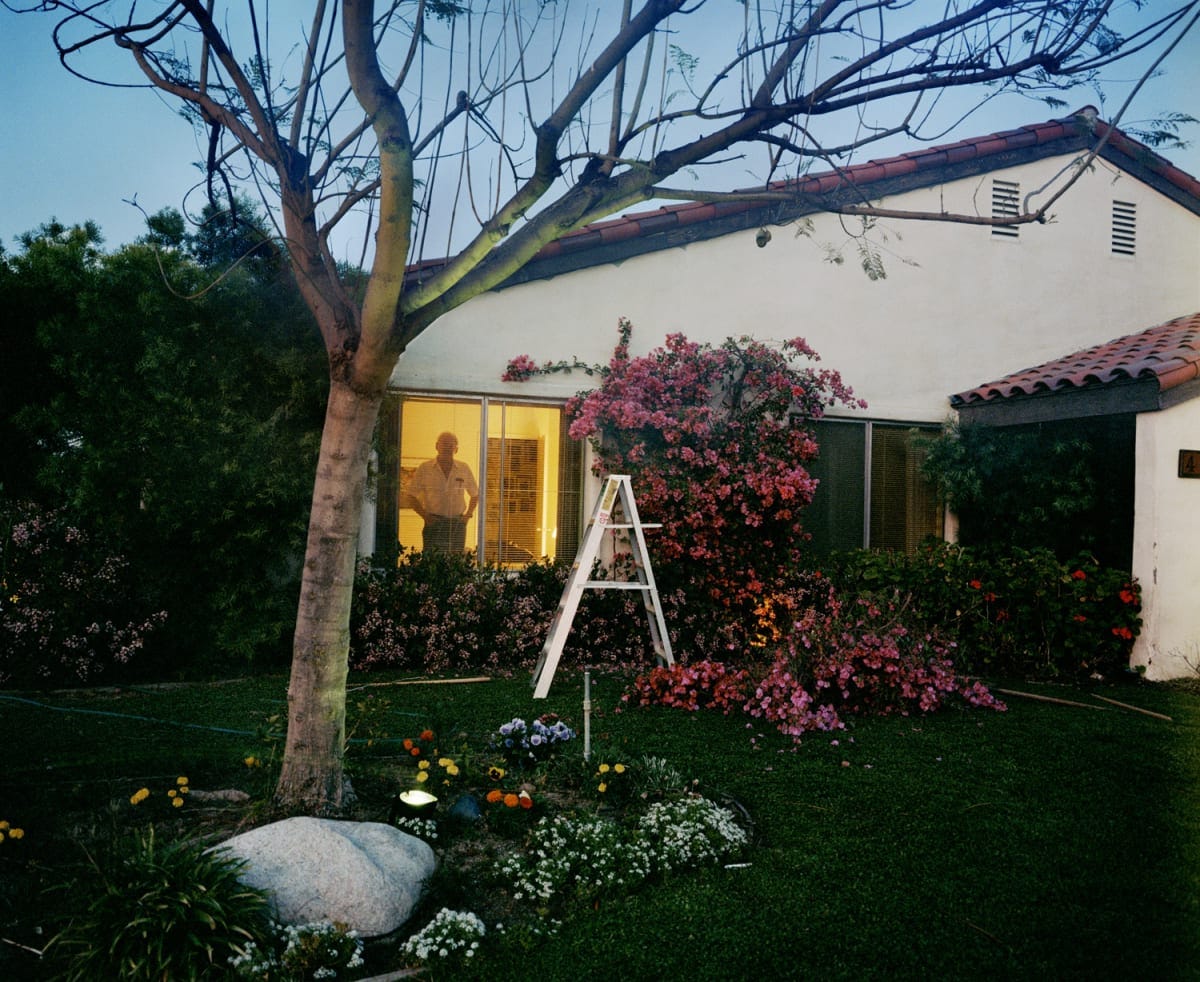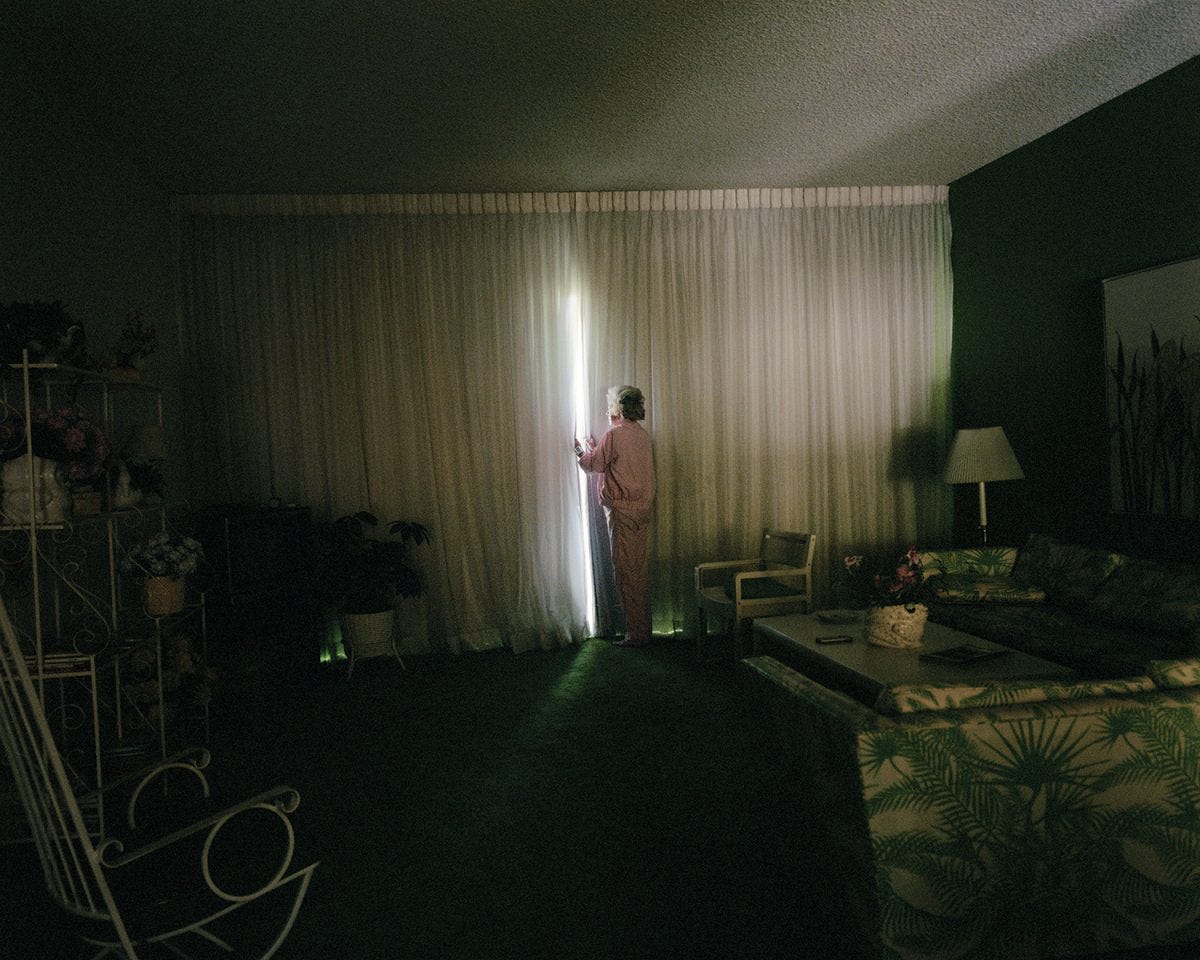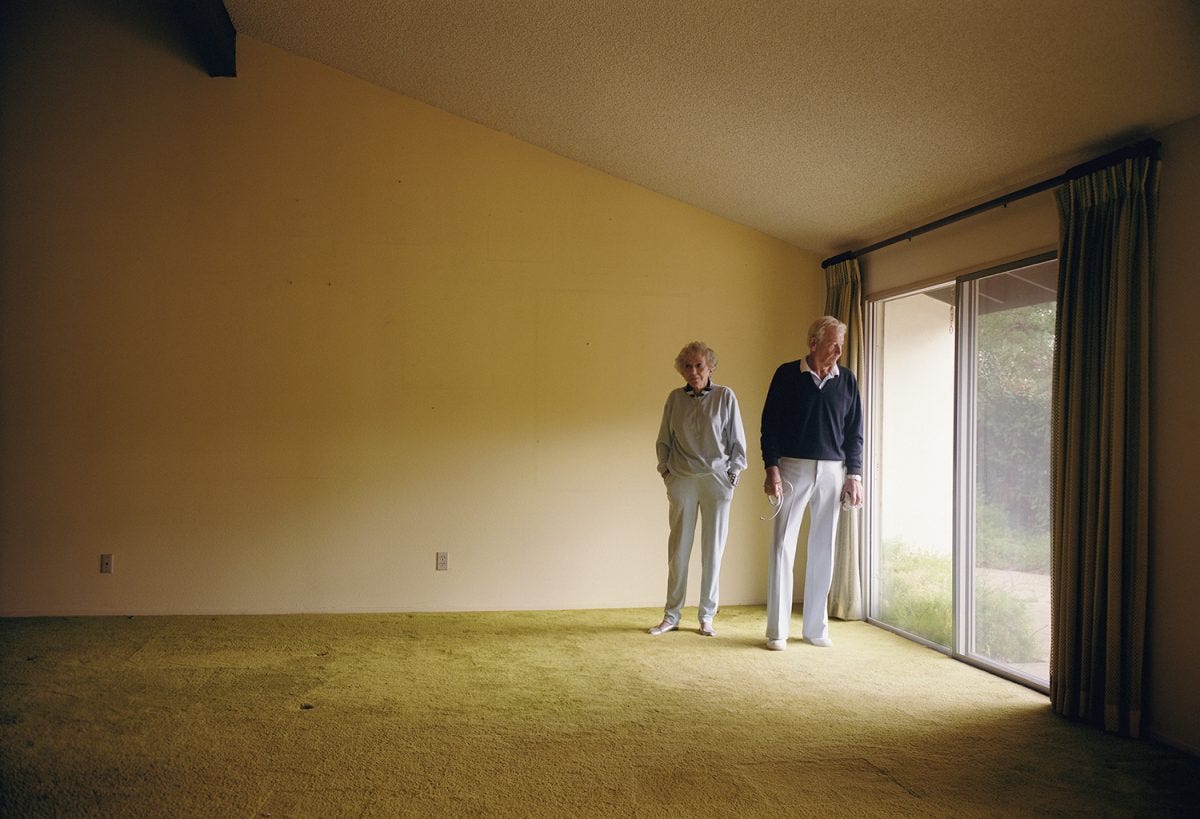MEMORY LANE
This year, I spent Thanksgiving with my family on the street where we used to live, in the house directly across from the one that we rented for over a decade, in a town we had moved away from and said goodbye to and had now, by miraculous benevolence, returned to for one blessed holiday. This was the house we moved into when father died. It was the house we lived in the longest. Mother, sister, brother, and I realized the last time the four of us were all together was when we moved out of this very house, now remodeled, repainted, and re-rented for double the price. We were, of course, very curious about the new tenants.
Lucky for us, these tenants have not yet discovered the use of curtains, making it easy for us to spy on them from across the street. There they were on full display in that ultra-modern white interior, people who have apparently never heard of warm-hued lightbulbs and eat their meals in silence side-by-side on their phones. It was like looking through the glass into a sterile operating room, that same mind-numbing lighting, when the doctors have just told you that they’ve done all they can and even if your father wakes up now, he won’t be your father. The house stands where it always stood, the bones are still there, it’s just not our house anymore.
When we moved away I’d made peace with the fact that I might never see this street again, and so, how quaint, to be back here, a ghost haunting its old playground. A walk down memory lane. Even the freeway exit feels nostalgic, tells you you’re close, you take the shortcut through the mostly empty parking lot, pass the purple jacaranda tree, follow the curve of the road, that old familiar bend. The house at the stop sign never disappoints, the owners commemorate every change of the season, every major and minor holiday, with kitschy homemade decorations. Take a left. When you see the white fire hydrant, you’ve arrived.
Our house. A one-story Eichler, small and cozy in that mid-century modern style, with a low-sloping roof and post-and-beam construction. The inside was all carpet until one day my mom ripped it off and uncovered the bare wooden floorboards underneath. There were rose bushes in the front and grass I remember, a huge blooming cactus that screamed “home”, and a big sprawling bird-of-paradise whose beaks pecked you on the way to the door. The front yard was green and abundant and quintessentially Californian and now it’s been razed down and replaced with mulch and pebbles and small suggestions of green, sitting there flat and unalive.
On the roof was where we occasionally smoked and watched the sunset and I suntanned one summer and took black-and-white photos of my friend with my first ever film camera. I printed the photos by hand in the dark room at the community college and still have them, somewhere, but no longer speak to that friend. There’s the bedroom I plastered with vintage Vogue magazines, the one my mom rented out after I left for college. There’s the hole my high school boyfriend punched in the wall. There’s the backyard where I sat so many days and nights, on a found couch, under a canopy decorated with chili-pepper Christmas lights. High, for hours.
Next door, in the house with the red maple tree, an elderly Japanese-American woman has lived for years, alone. I remember her always as a small and beautiful woman, sharp as a tack and yet gentle, bird-like. Her home is neat and tidy, the soft carpet somehow forever white and absorbing all sound, so that the place feels like a hushed cocoon. We are continuously amazed by how different her house feels from ours, how her dining chairs have little baby socks on each of the four legs, to help them slide smoothly against the floor.
We surprise her the morning of Thanksgiving, walking over in our slippers and robes. We ring the doorbell and wait. “It’s us!” we all say when she opens the door. “From next door!” She takes a moment to respond, all this not quite sinking in, us rambunctious Rosenbergs swarming her like a group of crazy street people, me with a blanket still draped over my shoulders, straight out of bed, and her probably thinking she is dreaming because this can’t be, these people moved away, what are they doing on her doorstep with still-warm mugs of coffee in hand?
“We’re visiting! We’re staying across the street!” we explain, and then she understands. “My god. How are you? I was looking at you going, I know that face, I know that face, but I can’t place it. Come in! Come in!”
We tell her we don’t blame her, the circumstances are very unusual. And then, just in case we haven’t boggled this poor old lady’s mind enough, we add in another surprise, introducing to her the latest human addition to the family, my niece, almost two years old, who did not yet exist when we were all here last. You don’t see someone for a few years and all of a sudden, they’ve birthed a new life. And the new life walks, and the new life speaks, and the new life asks for a banana the moment she enters your home. “Oh she’s adorable! What is her name?” she asks, as the little blonde girl sits on her immaculate leather sofa peeling a banana.
“You look exactly the same,” we tell her. “How old are you now?”
”Ninety-three,” she says and we are all amazed. “I know, I know.”
”Do you still garden?”
”No, no, my legs are getting weaker. But I’m still here. My body’s still going,” she chuckles wearily, “So I guess I’ve just got to keep going too.”
”Well you look great,” we say. “How are you spending your days?”
”I wake up in the morning and I do whatever I want. You know, it’s too bad, I didn’t get to do this when I was younger.”
She is still so lucid, catching every joke we make and quipping back. I look around and see piles of books stacked next to the sofa.
“You’re doing a lot of reading, it looks like.”
”I do read a lot. But you know, my mind, it just isn’t what it used to be. Sometimes I read something in one book and get it confused with another.”
She is being modest, I feel.
”That happens to me, too. It happens when you read a lot, or many things all at once.”
I walk over to the puzzle she has in progress, the pieces organized into colored sections, and each section kept in a separate Ziploc bag.
”You’ve got a great system going,” I tell her. “I like doing puzzles too.”
”Oh yes, that’s one of the things I do. I just started that one last week.”
We sit down again.
“What about you? Where are you living now?” she asks my sister.
“I’m still in New York.”
“And what are you doing there?”
“You know, pretty much the same thing,” my sister explains.
“And you,” she turns to me. “You’re still in Los Angeles?”
”Yeah! I am!”
She remembered.
”And what are you doing there?”
“I’m taking care of my friends’ baby. And well, what I really want to do is write. So I try, little things, here and there.”
”That’s wonderful.”
”Yeah.”
”And what about you?” she turns to my sister again. “Where are you living now?”
By the time my niece finishes eating her banana, the old woman has asked my sister the same question three times, never once remembering the answer. We invite her to come over for Thanksgiving dinner. “My son might stop by,” she keeps saying and we realize our visit might have overwhelmed her, that this much social interaction might be her limit for today. We stand up to go. “What a darling boy,” she says, patting my niece’s head. “What’s his name?” It becomes clear what she has been telling us all along, her mind is going. It’s a truth we were earnestly denying, because we wanted to remember her the way we always had. We promise to bring her over leftovers and pie, but as the words hang in the air, I am thinking, I might never see her again. “Take care of yourself in Los Angeles,” she tells me, grabbing my hands. “I expect a book from you!” Somehow, this, she remembered.
Across the street from her lives the couple who stole my cat. Picture this: You’re sixteen, your father has suddenly dropped dead and your family has to move to a cheaper place across town. Your best friend in this cruel world is a loyal cat you’ve raised since he was a kitten, who has never left your side and sleeps with you each night. The sudden change of environment has shocked your poor cat, making him disoriented and confused. Some childless couple in their 50s with nothing better to do abducts your cat, changes his name, and gives him a new collar. You and your brother (age nine) and older sister (twenty-five) politely knock on the front door and ask if they could please give your pet cat back to you. You can see your cat, in his brand-new collar, sitting on an armchair at the end of the living room, in sight but out of reach. You try to motion to him, and the couple moves to block your view.
“Please,” you and your siblings plead, standing there pitifully on their doorstep. “Our father just died.” Your little brother starts to cry.
”Well, we just lost our cat," they say. “And this one has chosen us.”
You threaten to take legal action against them, citing charges of Pet Abduction and Aggravated Catnapping, but the man’s a lawyer and nothing you say matters. You go back to your new home, empty-handed. You explain to your little brother that the cat, like your father, is never coming home again. With the cat, at least, you have someone to blame. Weeks later, you see your cat roaming the neighborhood, no longer wearing a collar. He appears at your back doorstep, wanting to come inside. You think he’s come back to you, but he frightens each time you approach him. You give him food he is too afraid to eat, as if he will be trapped again. “It’s me,” you say, trying to pet him. “Don’t you remember me?” But the look in his eyes says he doesn’t remember you at all. Other neighbors tell you he has been visiting them, too, and some of them leave food for him. He has become the neighborhood tramp. When he visits your doorstep, every few weeks, it is always the same thing. He comes to you, as if some memory, muscle or otherwise, told him to, but when you open the door, he can’t remember why he came. He looks at you with glassy eyes, hisses, and runs away again.
The neighbors haven’t seen the cat come around for many months now. We think he might have died. Weirdly, when we arrive for Thanksgiving, we discover that a new cat now roams the street, also an orange tabby. This new cat is not afraid, he approaches us with curiosity. He looks me right in the eyes. “Are you my cat?” I ask him silently but before he can respond, my niece comes bounding in. “Cat! Cat! Cat!” she shouts, moving toward him so that he runs away. She chases him across three front yards before I catch her, and the cat disappears into thin air. I wonder if this is the ghost of the cat I once knew, haunting this place, too.
So much about this place still feels like home, driving down the boulevard toward the mountains on the horizon, car dealership flags blowing in the wind. But even while we lived here, things were changing all the time. The ghost mall thrice revived and finally demolished, an entire downtown strip erected where nothing but a patch of dirt used to be, which once a year became a pumpkin patch. You think you know a place like the back of your hand and one day you say, “Since when have I had that freckle?” Life is a series of good-byes. I don’t know if you get used to change or you just learn not to count on things being the same. We can’t hold on to anything in this life but our memories. And when we’re old and unlucky and our memory goes too, well, shit. We’ll always have puzzles.








